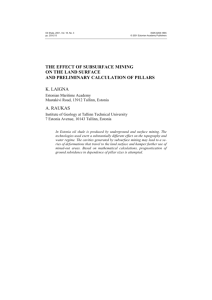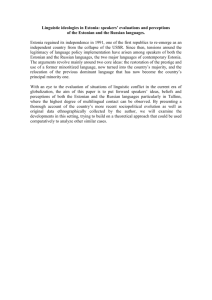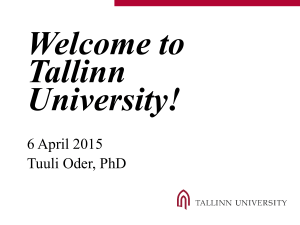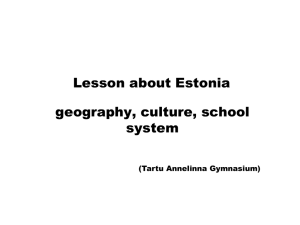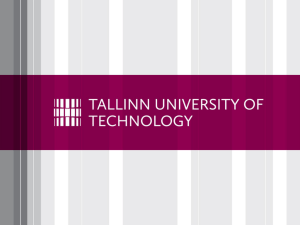ESTONIA C , E
advertisement
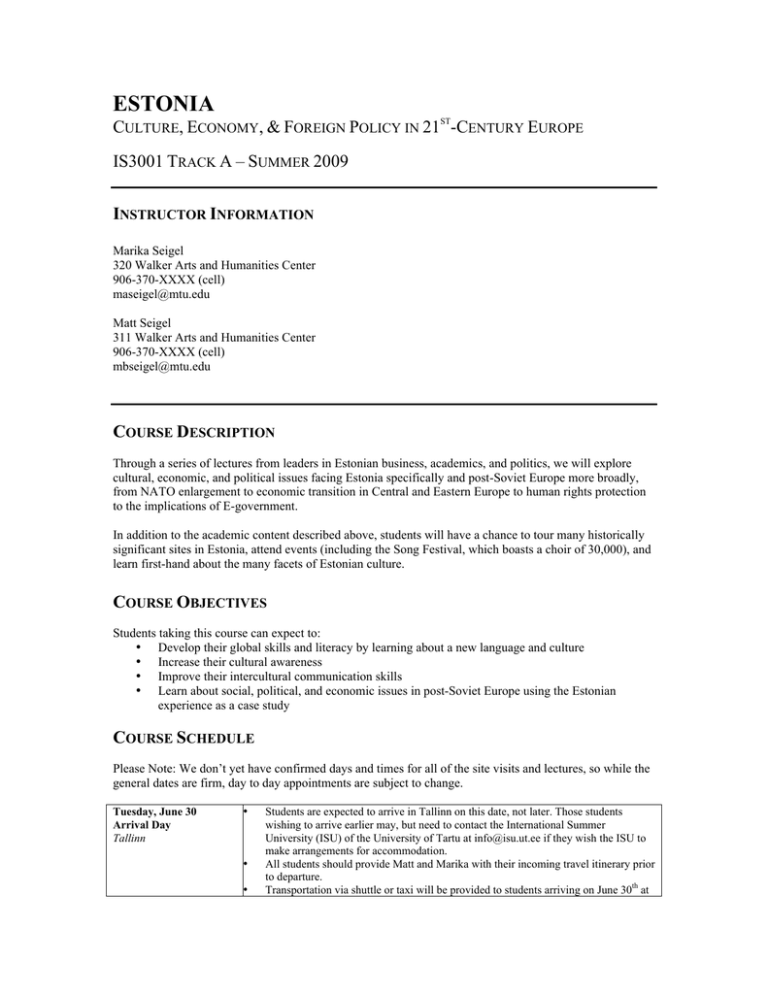
ESTONIA CULTURE, ECONOMY, & FOREIGN POLICY IN 21ST-CENTURY EUROPE IS3001 TRACK A – SUMMER 2009 INSTRUCTOR INFORMATION Marika Seigel 320 Walker Arts and Humanities Center 906-370-XXXX (cell) maseigel@mtu.edu Matt Seigel 311 Walker Arts and Humanities Center 906-370-XXXX (cell) mbseigel@mtu.edu COURSE DESCRIPTION Through a series of lectures from leaders in Estonian business, academics, and politics, we will explore cultural, economic, and political issues facing Estonia specifically and post-Soviet Europe more broadly, from NATO enlargement to economic transition in Central and Eastern Europe to human rights protection to the implications of E-government. In addition to the academic content described above, students will have a chance to tour many historically significant sites in Estonia, attend events (including the Song Festival, which boasts a choir of 30,000), and learn first-hand about the many facets of Estonian culture. COURSE OBJECTIVES Students taking this course can expect to: • Develop their global skills and literacy by learning about a new language and culture • Increase their cultural awareness • Improve their intercultural communication skills • Learn about social, political, and economic issues in post-Soviet Europe using the Estonian experience as a case study COURSE SCHEDULE Please Note: We don’t yet have confirmed days and times for all of the site visits and lectures, so while the general dates are firm, day to day appointments are subject to change. Tuesday, June 30 Arrival Day Tallinn • • • Students are expected to arrive in Tallinn on this date, not later. Those students wishing to arrive earlier may, but need to contact the International Summer University (ISU) of the University of Tartu at info@isu.ut.ee if they wish the ISU to make arrangements for accommodation. All students should provide Matt and Marika with their incoming travel itinerary prior to departure. Transportation via shuttle or taxi will be provided to students arriving on June 30th at the Tallinn Airport. Students arriving via ferry from Helsinki should notify Matt and Marika of their arrival time so transportation to the hostel can be arranged. • Students will be lodging in the MTU Dormitorium, Karu 17, in Tallinn, through Sunday, July 5. • The hostel’s website is: http://www.academichostel.com/eng/?id=info • Lodging in Tallinn will be at the MTU Dormitorium in the Academi Hostel, Karu 17, Tallinn. The hostel’s website, as above, is: http://www.academichostel.com/eng/?id=info • Breakfasts will be provided in the cafeteria at University of Tartu’s Tallinn campus. • There will be a Tallinn city tour on the afternoon of Wednesday, July 1, with a welcome dinner following. • Site visits will include: o The 2009 Estonian Song Festival concerts. http://www.laulupidu.ee/eng for more information. o The Tallinn offices of the Coca-Cola Company. o The Tallinn offices of Microsoft Estonia. o The US Embassy. o The European Commission Representation Office. o The Estonian National Art Museum. o An Estonian publishing firm. o The Estonian Ministry of Environmental Protection. • Lodging in Tartu will be at the Tartu Üliõpilasküla (Tartu Student Village), Pepleri 14, Tartu. Visit http://www.kyla.ee for more information. • Breakfast will be provided at the hostel. • There will be a Tartu city tour during the afternoon of July 08. • Site visits will include: o The Estonian National Museum. o A Le Coq Brewery. o The Estonian National Court. o The KGB Museum. • Lectures will be held on the Tartu University campus. More information at http://www.tartu.ee • Lodging on Saaremaa will be at the Jurna Recreation Farm, Jurna talu, Upa kula, Kaarma vald, 93857, Saaremaakond. Visit http://www.saaremaa.ee/jurna/21.html for more information. • There will be an introduction to the capitol of Kuressaare. • For more information on Saaremaa and Kuressaare, visit http://www.saaremaa.ee and www.kuressaare.ee • Lodging in Pärnu will be at the Hommiku Hostel, Hommiku 17, Pärnu. Visit http://www.hommikuhostel.ee for more information. • There will be a city tour in the afternoon of July 13. • Breakfast will be provided in a nearby cafeteria. • Lectures will be held on the campus of the University of Tartu, Pärnu College. • Site visits will include: o Tervise Paradiis, the largest SPA Resort in Pärnu. o A day trip to a nature reserve. o The Paikuse Saw Mill. • For more information on Pärnu, visit www.parnu.ee Lodging upon return to Tallinn will be at the Hotel G9, Gonsiori 9, Tallinn. Visit http://www.hotelg9.ee/ for more information. • Tuesday, June 30 – Sunday, July 5 Tallinn Sunday, July 5 – Friday, July 10 Tartu Friday, July 10 – Sunday, July 12 Saaremaa, Estonia Sunday, July 12 – Sunday, July 19 Pärnu Sunday, July 19 – Wednesday, July 22 Tallinn ACADEMIC PROGRAM NATO enlargement and transition of Foreign and Security Policy Frameworks. Lecturer: Dr. Andres Kasekamp, professor of Baltic politics and Director of the Foreign Policy Institute. Current lecture will explain main challenges related to NATO enlargement to CEE. One of the most crucial changes in CEE has been NATO enlargement. Need for defense for dominating neighbor Russia pushed most of the countries in the region to move towards NATO membership. At the same time NATO had to go through reform and redefining its aims, considering strong opposition from Russian side who still perceives NATO as its challenger in Europe. Understanding Economic Transition in Central and Easter Europe. Lecturer: Mr. Ülo Kaasik, Head of the Department of the Bank of Estonia. Current lecture will explain the basic concepts and challenges of economic transition in CEE. The process of economic transition has been crucial supplement for political transition and in CEE economic transition from the planned economics to the market economics has been strongly combined with the success and backlashes in political transition. The fifth round of the EU enlargement. Lecturer: Dr. Eiki Berg, Dean of the Department of Social Sciences. Current lecture analyses political challenges of the EU, which occurred with the enlargement to CEE in 2004-2007. One of the most crucial changes in Europe has been the EU fifth enlargement, which has been a parallel process of deepening integration inside the EU. It has been also a serious challenge for the CEE countries whose economic and political transition has been guided and determined a lot by the EU requirements. After ending the fifth round January 1, 2007 the EU feels enlargement fatigue and it raises a serious question – Does the EU move further or “European borders” are finally defined? Russian Foreign Policy. Lecturer: Mr. Marko Mihkelson, member of the Estonian Parliament and Chair of the European Affairs Committee. After briefly reviewing the main developments of the Soviet period, the lecture focuses on post-Soviet Russian foreign policy. The lecture surveys a range of contemporary issues, including Russia’s evolving relationship with the EU and the US, its positions regarding NATO and EU expansion, and its attempts to retain/establish regional hegemony in the former Soviet space Urban Structures and Restructuring in Eastern Europe. Lecturer: Dr. Garri Raagmaa, Professor and Director of Pärnu College. Current lecture will analyze economic challenges of the EU after its enlargement in 2004-2007. Most of the new EU members have been former soviet countries. It has a strong impact on their economic development since 1990s. The EU is dealing with stagnated Western European economy, at the same time the new EU members offering strong internal competition for the old members with their economic advantages (e. g. cheaper production costs). The issue of the Russian-speaking minority. Lecturer: Dr. Vello Pettai, professor of comparative politics. In the Soviet period, the Baltic States experienced dramatic demographic changes. After decades of massive immigration from the East, Russian-speakers constituted 1/3 of Estonia’s population and almost a half of Latvia’s population by the early 1990s. What policies have these states pursued towards their sizable minorities? Are the complaints of Russian officials about the mistreatment and discrimination of ethnic Russians in the Baltic States justified? Brief overview of relevant policies and legislation (citizenship, language, education, etc) and the process of „social integration. “ The problems of the integration of immigrants in Europe. Lecturer: Dr. Vello Pettai. The lecture focuses on the social, economic and political aspects of immigration in the European Union and has a forward-looking emphasis of the solutions and recommended policies. Soviet Collapse from the Baltic Perspective. Lecturer: Dr. Marju Lauristin, Professor of Communication. Which problems and grievances led to the collapse of the USSR? Brief summary of the history of Soviet annexation and occupation of the Baltic States. How did the idea of restoring independence evolve? Brief summary of the process of restoring independence. Retrospective assessments: why no Soviet nostalgia in the Baltics? Human Rights Protection in Europe. Lecturer: Dr. Mart Susi, Program Director of International Summer University. The lecture will focus on the situation of human rights in Europe and its various protection frameworks. Special attention is given to the work of the European Court of Human Rights and its role in shaping the common European approach to fundamental rights. Building Information Society and E-Government. Lecturers: Mr. Hannes Astok and Ms. Liia Hänni. EGovernment is an emerging field with very interesting implications for the future of public administration and political processes. Estonia as a country is in the forefront of these issues. This expanded lecture will offer both theoretical insights into e-governance as well as practical lessons and hands on experience on how e-government is set up in Estonia. It is suitable to students with interest into future of governance as well as wider application of IT issues. Specific IT knowledge as prerequisite is not necessary. An open mind and fascination with technology is most welcome! The lectures will be taught by the e-gov practitioners who all have university level teaching background and the first-hand knowledge in the issues they address. COURSE POLICIES & REQUIREMENTS General Behavior. Students traveling abroad are ambassadors of the United States, of Michigan Technological University, of Matt and Marika Seigel, as well as of their home communities and their families, and should conduct themselves with both pride and decorum. Do not behave in an overtly loud and obnoxious manner. Attempt, whenever possible to use a little Estonian. Be courteous, kind, and respectful. Remember that you are a guest in Estonia. Use common sense. Attendance & Participation. Students are expected to be punctual and in attendance at all scheduled events. Free time, and there is a lot of it, is the students to do with what they will. Illness and emergencies will be dealt with on a case-by-case basis. Students are expected to participate fully, to be engaged and engaging, to interact with their classmates and others courteously and with respect, to immerse themselves in Estonian culture whenever possible, comport themselves with pride and dignity, etc. Assignments. Students are expected to keep a daily journal. This journal can be a place for notes, anecdotes, travelogues, diary entries, etc. The purpose of the journal is to help students stay alert, pay attention, and create a written record of their experiences. Notes and pens are recommended, but electronic options are permissible with permission. Journals will be collected weekly for a pass/fail evaluation. In order to pass, you need to have completed daily journal entries that demonstrate engagement with the culture and with course activities. Students are expected, upon returning to home, to write a 10 – 12 page reflection paper. The following questions may provide some guidance for reflection, both while on the trip and after returning home. Consider using these questions as prompts in your journals. • What aspects of the experience abroad do you feel have helped you prepare for your future? • In the time that you’ve spent abroad, have your views/attitudes/outlook changed at all? • Did your time abroad change you at all? • Was there anything about Estonia that was very attractive or unattractive to you? • What do you think are the major differences between yourself and the people you interacted with in Estonia? • What have you learned about yourself that you didn’t know before you went to Estonia? • What was your personal purpose for taking this trip? • What did this trip teach you about reacting to unfamiliar situations? • What did this trip teach you about yourself? • What do you think is the best way to understand a new culture? • What major cultural differences did you encounter and what did you learn from them? • What can the city’s layout tell you about cultural values? • What did it feel like to be a foreigner and has your experience broadened your conception of foreigners in your own home culture? • Did your conception of “American” change in any way as a result of your experience? • Has your conception of the world changed in any way as a result of your experience? Your reflection paper must be posted to Blackboard by Monday, July 27. Grading. In order to earn an “A” in this course, you must complete all journal entries, attend all required events, conduct yourself in a professional and respectful manner, and write a thorough and thoughtful reflection paper. Individual course components receive the following weighting: Attendance and participation: 40% Journal entries: 30% Reflection paper: 30% Please note that we reserve the right to lower not only your participation grade, but also your overall grade (up to and including an F), if you miss an excessive number of scheduled lectures, field trips, and other cultural events or if you behave in a consistently disrespectful or inappropriate manner. We will notify you in writing if you are in danger of having your overall grade lowered. Grading system: A: 93% & above AB: 87% – 92% B: 82% – 86% BC:76% – 81% C: 70% – 75% CD: 65% – 69% D: 60% - 64% F: 59% and below Late assignment policy. You cannot make up journal entries that you have missed during the week once we have collected the journals. The final paper will be docked one full letter grade (AB, BCCD) for each day that it is late. Plagiarism/collaboration policy. All writing that you submit for this course should be your own. We encourage you to share ideas with one another, but please do your writing individually. Instances of intentional and deliberate plagiarism will be handled according to the academic integrity policy (see website below). For the formal reflection paper, please cite your sources using the MLA format. UNIVERSITY POLICIES Michigan Tech has standard policies on academic misconduct and complies with all federal and state laws and regulations regarding discrimination, including the Americans with Disabilities Act of 1990. For more information about reasonable accommodation for or equal access to education or services at Michigan Tech, please call the Dean of Students Office, at (906) 487- 2212 or go to http://www.mtu.edu/provost/faculty-resources/syllabus-policies/ COUNTRY AND TRAVEL INFORMATION Food. Both the food and water in Estonia are safe for consumption and your approach to food safety shouldn’t differ in the any way from that which you practice at home. Though Estonian food is a unique cuisine unto itself, students will find that it is very similar to that of its Baltic, Germanic, Polish and Scandinavian neighbors, and not totally unrecognizable when compared with much of what’s eaten across the upper Great Lakes region of the United States – lots of meat, seafood, dairy, sauerkraut, and potatoes. Food does tend to be very rich, so don’t over eat. Supermarkets in Estonia stock a wide assortment of fresh and packaged food. Restaurants are numerous and vary widely. In larger cities, the cuisine is very cosmopolitan (there’s a very good Indian restaurant in Tallinn). McDonald’s and other “American” fair are fairly widely available. Students are expected to be open, accommodating, and courteous when it comes to food and to try things. Always be polite and accommodating when food is offered to you. Like in many American households, Estonians will often lavish food upon guests, and just like in America, turning up one’s nose at it would be deeply, deeply insulting. Try everything, decline seconds if you don’t like it, politely, and never ever hold your nose or complain. Remember, you’re going to Estonia to broaden yourself and that includes your palate. Alcohol. Estonia is traditionally a drinking culture. Beer and liquor (most notably vodka) are available in profusion and students will all be well above the legal drinking age. If you choose to imbibe, you should know your limits and use common sense. If you are being offered alcohol by a host, you needn’t feel obligated to drink and may politely decline without causing offense. If you do drink, never try to “keep up” (you can’t), and leave your glass full or half full when you are ready to stop (an empty glass is often treated as an invitation for next full glass). There will be zero tolerance for drunken and disorderly conduct and offenders will be sent home at their own expense. Use common sense, know your limits, and behave responsibly. Safety. Estonia is one of the safest countries in the world and the city of Tallinn is much safer than most of its American counterparts. That said, you should exercise the same caution as you would anywhere. Be aware of your surroundings. Travel with a friend. Don’t wander around alone at night. Don’t flaunt money. Don’t get drunk. Don’t draw unnecessary and/or negative attention onto yourself. Don’t take unnecessary chances or risks. Use common sense. And listen to your instincts. Insurance. Michigan Tech recommends all students obtain health insurance that will cover them while they are traveling. If you don’t have other options, we recommend you obtain an ISIC Card (International Student Identification Card) before departing the U.S. An ISIC Card will provide you with the minimum coverage recommended for traveling abroad. Visit the ISIC Web site for more information or contact the Study Abroad office. Health & Wellness. Health care in Estonia is very good. In the event of an emergency, you’ll be well taken care of. Prescription medication is also readily available, but we recommend you take enough refills to last for your entire trip. Keep all prescription medication in the original containers. Take an original written prescription, preferably written for a generic version of your medication. If you wear glasses or contact lenses, take along a spare pair and take your lens prescription with you. If you take a narcotic, take more than two medications, or take a medication by injection, carry a letter from your physician that describes your medical condition and the need for the medications and/or syringes. If you have a medical condition that merits it, wear a medical tag explaining your illness or allergies. Medic Alert Foundation International is a worldwide organization that supplies tags containing an identification number, the medical information, and a toll-free telephone number to call in case of emergencies. Once you join, you are a lifetime member. Check at your local drugstore, or contact Medic Alert, P.O. Box 1009, Turlock, CA 95380. Carry a card in your wallet identifying your illness (Medic Alert can supply this also). For everyone, drink lots of water and juice, avoid soft drinks, and consume caffeinated beverages and alcohol in moderation. Eat lightly as the food will be very rich, and make an extra effort to eat plenty of fruits and vegetables. A radical change in diet can cause gastro intestinal distress and we all know how unpleasant that can be. You are what you eat. Jet lag can be mitigated if not eliminated by taking a little extra care. While traveling, move around as much as possible – get up and walk around at least once an hour. Try to get plenty of sleep before departure. Anticipate a day of adjustment for each time zone you cross. Consider the Ehret method of dealing with jetlag – three days in advance of your trip, start shifting your activities as if you were already in the new time zone; three days prior, eat three full meals with breakfast and lunch high in protein and dinner high in carbohydrates; two days prior, fast, low calories and low carbohydrates (soups and salads); one day prior, three full meals again, per the first day; on the day of departure, fast again, with lots of liquids. Upon arrival in the morning, eat a high-protein meal; if you arrive in the evening, eat a highcarbohydrate meal. Regardless of what you do, mind your body, and you’ll transition that much faster. Money Tips Money. It is helpful to have $50-$100 in local currency on your person at all times, but not more. This can be obtained before departure in most international airports assuming you want to hit the ground running. Some local banks and travel agencies will convert your currency as well. Service fees will almost always apply and will vary widely. Exchange rates vary from day to day and from source to source. Rates in the U.S. are typically worse than abroad, so do most if not all of your exchanges after you arrive. Write down the contact numbers of your bank, debit, and credit cards prior to departure. Keep these numbers in a safe place, separate from your wallet or purse, in case of loss or theft. Set up an online bank account prior to departure, enabling you to check your balance and pay bills while abroad. Keep emergency money in a separate and secure location from your wallet or purse. Use a money belt if you must carry copious amounts of cash, never flaunt money openly, and be conscious of your surroundings while handling currency in public (much as you would at an ATM in the States). ATM and debit cards will be usable virtually everywhere you go in Estonia. You can anticipate the same kinds of problems and limitations as you would find in the UP – i.e. there will be places without ATMs or places that simply only deal in cash (so always have at least a little cash on you). Prior to departure, contact your bank and find out if there’s anything you need to do prior to departure (is your PIN good abroad; is your card connected to a world-wide system such as Cirrus or Plus; what kinds of fees can you expect; what’s your daily withdrawal limit and is it adequate for your needs. In addition to a debit card, we recommend having at least one credit card while abroad. Visa and MasterCard are widely accepted in Estonia and are highly recommended in case of emergencies. Credit cards are convenient, reduce the amount of cash you need to carry, and automatically give you a good exchange rate. Drawbacks include overspending and high interest rates on unpaid balances. Again, check with your bank to make sure your card is approved for use abroad (many credit cards will be automatically deactivated if charges suddenly appear from somewhere far outside your usual haunts). We don’t recommend traveler’s checks, but they do come with some advantages (like being insured in the event they’re lost or stolen). Exchange rates are often higher and with cash or credit and getting them cashed can be a pain, but your definition of pain may be different than ours. If you go this route, keep a copy of your checks at home, in case they are lost. In terms of the amount of spending money to have at your disposal, that depends entirely on what kind of spender your are and/or can be. As your lodging and breakfast are included in your program fee, you can expect that between $15 and $30 a day will feed and entertain you very well, particularly if you eat and entertain yourself as the locals do. You will be able to stay happily and contentedly fed and diverted for less, certainly, and shoestring travel in Estonia is an entirely possible reality. If you’re a shopper, you’ll find prices for local arts and handicrafts are a real value and flea and farmers markets abundant and cheap, but you’ll pay as much or more for “label” shopping as you would in the States. Creativity and imagination pay a lot and the opportunity for free experiences will be overwhelming. Regardless, figure out what you can afford, make a budget, and stick to it. Scrimp and save on days when you can and allow yourself to splurge a little a few times (you may only get to Estonia once in your life). Cell Phones Electronics. Estonia, like the rest of Europe clocks in at 220 volts AC, 50 Hz. The vast majority of plugs that you’ll see will be European standard (some Soviet-era buildings may not be, but that shouldn’t be much of a concern for us). So to run your American electrical devices like hair dryers, or to charge your computers and cell phones, make sure your bring an appropriate plug adapter (and converter if necessary). Radio Shack and similar outlets will be able to help you out, but take care of this before you go. For your cell phones, contact your carrier. Almost every company is going to have a plan that will allow you to use your cell phone all over the globe and on a short-term plan, but you’ll want to make these arrangements prior to departure. Wireless will be widely available in Estonia (they are a very, very wired country). So iPhones, Blackberries, and the like can be very useful. Laptops equipped with wireless, likewise. The added bonus of a laptop are programs such as Skype which will allow you to make video calls for free with other Skype users. Set this stuff up prior to departure to ensure you can use your gadgets. Before you leave. Plan ahead. • Make arrangements to have your mail forwarded or stopped as appropriate. • Review your packing list, purchase any last-minute items. • Inform your bank, credit card company, etc. that you’ll be out of the country and make sure your credit card will not charge you “currency exchange fees”. • Contact your cell phone provider regarding coverage and rates. • Focus on getting your rest and preparing yourself mentally. The anticipated time-change and the jet lag that arises may leave your mind foggy. • At least 72 hours prior to departure: o call the airline(s) to reconfirm your flight(s) and the information in items above. Some airlines will cancel your space if you do not reconfirm. Ask if there have been any flight or schedule changes. o Know your flight itinerary, but assume changes will need to be made to your schedule so delays or cancellations won't be so stressful. Have an alternate plan ready in case your flight is delayed or canceled. Jot down some possible alternate airline phone numbers. Sometimes it's faster to make a reservation from an airport public phone than to stand in line at a ticket counter. o Look at your layover times and the online terminal map to assess the distance between terminals and how fast you’ll need to move between flights. International airports are huge and may require a long walk, shuttle, etc. o Check the weather at your destination and connecting cities along the way. You can't do anything about the weather, but you can be prepared for it. Check the Internet for domestic and overseas conditions. o Check in with Matt and Marika, make sure they have your itinerary and are aware of any changes that have taken place since you last spoke with them. • On your travel day: o Call the airlines – are your flights on schedule? o Check in at the airport at least three hours prior to departure for international flights, one hour early for U.S. connections. o You should receive a boarding pass and seat assignment for each flight. Verify information with airline personnel, not fellow travelers or computer displays. o If you have problems with an airline, review your options calmly with airline personnel. If an acceptable solution cannot be reached, speak with a supervisor. Generally, airlines will not take responsibility for mechanical or weather-related delays, but they must provide alternate flights. If the delay is their fault (overbooking, etc.), they must provide lodging, a longdistance call if someone is waiting for you, and meal expenses or denied boarding compensation, plus an alternate flight. Keep your cool. o If luggage is lost or damaged, a claim must be filed at the airport. Keep your claim checks. Often, airlines will pay for immediately-needed items (toothbrush, underwear, other things needed within 1-2 days) while your bags are being located. Again, keep your cool. o Carry your tickets and documents with you at all times. o Don’t leave your bags unattended. o Pack your sense of humor and keep it with you, but don't expect any from security personnel, immigration, etc. Watch what you say. Do not joke around security personnel, and never mention “bombs” or “weapons”, etc. o Be patient. Relax and enjoy the trip. You're almost there! o Upon arrival, proceed through immigration and customs. Packing Tips. Pack as light as you are willing and able. Not only do airlines have increasingly strict guidelines on the amount of luggage you can take on a plane without additional charges, but you’ll find your travel much more enjoyable if you’re not lugging around an excess of baggage. Take only what you need and only the amount of luggage you can easily handle and transport by yourself, that you won’t mind lugging across an airport and/or several city blocks. Then: • Choose luggage that can withstand a lot of rough treatment. Are the straps and handles strong enough? Will the zippers hold? Purchase the sturdiest luggage you can afford. • Put something easily recognizable and brightly colored on your suitcase for easy identification at the luggage claim. • Do not bring valuables unless absolutely necessary. • Do not carry all difficult-to-replace items (passport, cash, credit cards, etc.) in one place, and never pack them in luggage that you plan to check. Photocopy valuable documents and keep copies in each suitcase, and leave a set at home for ease of replacing them if lost or stolen. • Pack prescription medications in your carry-on, in case your checked luggage is lost. • Review the current Federal Aviation Administration Permitted/Prohibited Items (what you can and cannot carry on board) at <www.tsa.gov/travelers/airtravel/prohibited/permitted-prohibiteditems.shtm>. • Pack all luggage, especially carry-ons lightly and smartly. Remember to put prescription medicines, a change of underwear, and toothbrush in your carry-on just in case your luggage doesn't arrive with you. Packing Lists Suggested Packing Lists. Essentials (this is probably your carry-on bag): · Carry-on bag. Think “double duty” here – a small backpack or shoulder bag that will work for day travel once you get to Estonia) · Passport – this is your I.D. Very important. · Credit card(s), travelers' checks (if you plan to use them), and/or ATM · $50-$100 cash · A copy of your travel itinerary · Plane tickets/boarding passes/ferry tickets/etc. · Additional photo I.D. (i.e. driver’s license, ISIC card, etc.) · Camera · Cell Phone · iPod or similar with headphones · passport pouch (optional) · reading material · ear plugs (highly recommended) · toothbrush · toothpaste · Prescription medications · Written prescriptions for medication and/or eye glasses · Tylenol/Motrin/Aspirin/etc. · one day’s change of clothes · contact phone numbers – home and destination Clothing: · Clothing – think carefully, plan your outfits, and try to pick clothing that is interchangeable so that you maximize your options without over-packing · Comfortable walking shoes or boots · Sandals or flip flops · One nice outfit (for going out or for a special occasion) · Socks · · · · · · Sweater(s) Underwear Swimsuit Pajamas Hat A light jacket and a raincoat and/or waterproof windbreaker Toiletries: Take those toiletries you would normally travel with, but remember that you’ll be able to easily replace any or all of your toiletries in Estonia. So you needn’t pack an excess of, say, tampons or contact lens solution. A compact with toothbrush, toothpaste, deodorant, small shampoo/conditioner, razor, makeup, etc. will see you through. You can purchase other things as needed. Pack light! Misc.: · · · · · · · · Small backpack or shoulder bag for day trips (see ESSENTIALS above) electrical voltage adapter and/or converter kit laptop computer portable USB Data Drive journal and pen course packet sunglasses compact umbrella Emergency Phone Numbers. • MTU Safety Office, (906) 487-2216, 24 hours a day / 7 days a week. • IPS Office, (906) 487-2160. • Greta Gustafson’s cell, (616) 893-XXXX. • Marika Seigel’s cell, (906) 370-XXXX. • Matt Seigel’s cell, (906) 370-XXXX. • Anne-Mai Ilumäe, program assistant for the International Summer University in University of Tartu, cell 372 5827XXXX, office 372 7376609. USEFUL ESTONIAN PHRASES Basic phrases jah - yes ei - no palun – please; you're welcome aitäh - thanks tänan - thank you tänan väga - thank you very much tere - hi, hello tervist - hello tere hommikust - good morning tere päevast - good afternoon tere õhtust - good evening tere tulemast - welcome head aega - goodbye head ööd - goodnight nägemist! - bye, see you! ilusat päeva! - have a nice day! vabanda - excuse me (familiar) vabandage - excuse me (polite) vabandust - sorry pole viga - no problem kas sa räägid inglise keelt? - do you speak English? (familiar) kas te räägite inglise keelt? - do you speak English? (polite) ma ei räägi eesti keelt - I don't speak Estonian ma ei räägi palju eesti keelt - I don't speak much Estonian ma räägin natuke eesti keelt - I speak a little Estonian ma räägin tõesti vähe eesti keelt - I only speak very little Estonian palun rääkige aeglasemalt - please speak more slowly (polite) ma saan aru - I understand ma ei saa aru - I don't understand ma tean - I know ma ei tea - I don't know kus asub tualettruum? - where is the toilet? Emergencies appi! - help! ole ettevaatlik - be careful ettevaatust! - watch out! palun aidake! - please help! kutsu kiirabi! - call an ambulance! (familiar) kutsuge kiirabi! - call an ambulance! (polite) on juhtunud õnnetus - there's been an accident minu rahakott varastati ära - my wallet has been stolen peatage varas! - stop thief! kutsuge politsei! - call the police! ma olen eksinud - I'm lost tulekahju! - fire! kas sinuga on kõik korras? - are you ok? (familiar) kas teiega on kõik korras? - are you ok? (polite) General Conversation kuidas läheb - how's it going? kuidas sinul läheb? - how are you? (familiar) kuidas teil läheb? - how are you? (polite) kuidas käsi käib? - how are you? kuidas sa elad? - how are you? (familiar) tänan, hästi - I'm fine, thanks normaalselt - I'm ok läheb - it's going ok halvasti - bad mis su nimi on? - what's your name? (familiar) mis on teie nimi? - what's your name? (polite) minu nimi on ... - my name is ... ma olen ... - I'm ... tore sinuga tuttavaks saada - good to meet you (familiar) meeldiv teiega tuttavaks saada - a pleasure to meet you (polite) kui vana sa oled? - how old are you? (familiar) mis tööd sa teed? - what do you do? (familiar) mis tööd te teete - what do you do? (polite) kes sa ametilt oled? - what do you do?(familiar) ma olen üliõpilane – I’m a student kas sa suitsetad? - do you smoke? (familiar) kas te suitsetate? - do you smoke? (polite) jah, ma suitsetan - yes, I smoke ma ei suitseta - I don't smoke kas ma tohin suitsetada? - do you mind if I smoke? mis on su telefoninumber? - what's your phone number? (familiar) kas sa oled vaba täna õhtul? - are you free this evening? (familiar) kas sa oled vaba homme pärastlõunal? - are you free tomorrow afternoon? (familiar) kas sa oled vaba homme õhtul? - are you free tomorrow evening? (familiar) kas sul on nädalavahetuseks plaane? - do you have any plans for the weekend? (familiar) Eating and Drinking kas teil on vabu lauda - do you have any spare tables? paluks lauda kahele - a table for two, please paluks lauda kolmele - a table for three, please paluks lauda neljale - a table for four, please ma sooviksin panna kinni lauda - I'd like to make a reservation mis ajaks? - when for? täna õhtul kella seitsmeks - this evening at seven o'clock täna õhtul kella kaheksaks - this evening at eight o'clock täna õhtul kella üheksaks - this evening at nine o'clock täna õhtul kella kümneks - this evening at ten o'clock homme kella kaheteistkümneks - tomorrow at noon homme pärastlõunal kella üheks - tomorrow afternoon at one o'clock homme pärastlõunal kella kaheks - tomorrow afternoon at two o'clock homme pärastlõunal kella kolmeks - tomorrow afternoon at three o'clock kui mitmele? - for how many people? mul on laud kinni pandud - I have a reservation paluks menüüd - the menu, please paluks veinikaarti - the wine menu, please ma olen taimetoitlane - I'm a vegetarian ma ei söö liha - I don't eat meat head isu! - bon appetit! kas see on kõik? - is that all? kas see oleks kõik? - is that all? kas te soovite veel midagi? - would you like anything else? arve, palun - the bill, please kas teil saab kaardiga maksta? - can I pay by credit card? eelroad - starters supp - soup hernesupp - pea soup tomatisupp - tomato soup köögiviljasupp - vegetable soup kartulisalat - potato salad (with meat) rosolje - beetroot salad (with herring) pearoad - main courses heeringas hapukoorekastmes - herrings in sourcream sauce verivorst hapukapsaga - blood sausage with sauerkraut sealiha praad - roast pork kanafilee - chicken fillet hautis - stew lihapallid - meatballs pitsa - pizza hamburger - hamburger magustoidud - desserts pannkoogid - pancakes pannkoogid moosiga - pancakes with jam jäätis - ice cream suupisted - snacks küüslauguleivad - garlic bread (made with rye bread) pelmeenid - small meat dumplings marineeritud kurgid - pickels friikartulid - chips soolapähklid - peanuts krõpsud – potato chips oliivid – olives At a bar or café mida sa juua soovid? - what would you like to drink? (familiar) ma sooviksin ... - I'd like ... ühe tassi kohvi - a cup of coffee ühe tassi teed - a cup of tea ühe tassi kuuma šokolaadi - a cup of hot chocolate üks õlu, palun - a beer, please üks klaas valget veini, palun - a glass of white wine, please üks klaas punast veini, palun - a glass of red wine, please üks kuum šokolaad, palun - a hot chocolate, please õlu - beer vein - wine viin - vodka brändi – brandy terviseks! - cheers! paluks veel üks õlu - another beer, please paluks veel kaks õlut - another two beers, please paluks veel üks kohv - another coffee, please paluks veel kaks kohvi - another two coffees, please paluks veel ühed - another round, please
